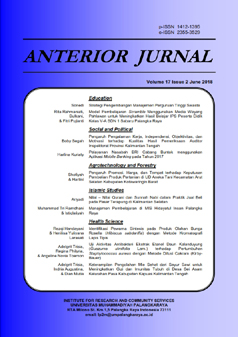Transformasi Digital: Pemanfaatan Learning Management System dalam Pembelajaran Literasi Al-Qur’an Digital Transformation: Use of Learning Management System in Learning Al-Qur'an Literacy
Main Article Content
Abstract
This research aims to analyze the use of a Learning Management System (LMS) to increase the effectiveness of Al-Qur'an literacy learning and analyze the role of technology in facilitating students' active participation in Al-Qur'an learning. The research method used is descriptive qualitative research using the library research method. The data collection technique is by examining theories from various book literature, journals, and research related to LMS and Al-Qur'an literacy that have been carried out. The sources were taken from books entitled Development of LMS SiCeria (Indonesian Smart Students) and AL-Qur'an Literacy: Tahsin-Tilawah Learning Model Based on Talqin Taqlid. The analysis technique goes through four stages, namely data collection, data reduction, data presentation, and the final step drawing conclusions and verification. The results prove that the LMS for learning Al-Qur'an literacy is one of the innovations in learning Al-Qur'an which is quite effective in the current digital era. By utilizing the LMS feature which can be used to store and create material to be taught, collect student assignments, and share links to teaching media such as videos, teachers can also assess their students' assignments and access them online. The use of LMS in learning Al-Qur'an literacy is very dependent on teacher innovation and student enthusiasm. The results theoretically and practically contribute to teachers and lecturers increasing their innovation in presenting Al-Qur'an literacy learning through LMS. Apart from preparing infrastructure, increasing human resources by providing training for teachers to integrate this LMS in the Al-Qur'an literacy learning process must also be prioritized.
Downloads
Article Details

This work is licensed under a Creative Commons Attribution-ShareAlike 4.0 International License.
All rights reserved. This publication may be reproduced, stored in a retrieval system, or transmitted in any form or by any means, electronic, mechanical, photocopying, recording.
References
Asmaroini, Ambiro Puji. 2023. “Penggunaan LMS Berbasis Mobile Menggunakan Design Thinking Pada Mata Kuliah Pancasila.” Jurnal DImensi Pendidikan Dan Pembelajaran 11 (1).
Buchan, M. Claire, Jasmin Bhawra, and Tarun Reddy Katapally. 2024. “Navigating the Digital World: Development of an Evidence-Based Digital Literacy Program and Assessment Tool for Youth.” Smart Learning Environments 11 (1). https://doi.org/10.1186/s40561-024-00293-x.
Firman, Firman, Muh Arief Muhsin, and Goestina Goestina. 2021. “Online Based Learning Management System (LMS) on Student Academic Performance.” AL-ISHLAH: Jurnal Pendidikan 13 (1): 788–93. https://doi.org/10.35445/alishlah.v13i1.415.
Haeruman, Leny Dhianti, Dwi Antari Wijayanti, and Qorry Meidianingsih. 2021. “Efektivitas Blended Learning Berbasis LMS Dalam Pembelajaran Matematika” 5: 80–84.
Hakim, Rosniati, Mahyudin Ritonga, Khodijah Khodijah, Zulmuqim Zulmuqim, Remiswal Remiswal, and Ahmad Reshad Jamalyar. 2022. “Learning Strategies for Reading and Writing the Quran: Improving Student Competence as Preservice Teachers at the Faculty of Tarbiyah and Teacher Training.” Education Research International 2022. https://doi.org/10.1155/2022/3464265.
Hanafi, Yusuf, Nurul Murtadho Murtadho, Muhammad Saefi, Universitas Islam, Negeri Maulana, Malik Ibrahim, and M Alifudin Ikhsan. 2019. Literasi Al-Qur’an Model Pembelajaran Tahsin-Tilawah Berbasis Talqin-Taqlid. Sidoarjo: Delta Pijar Khatulistiwa.
Jailani, M Syahran. 2017. “Pengembangan Sumber Belajar Berbasis Karakter Peserta Didik (Ikhtiar Optimalisasi Proses Pembelajaran Pendidikan Agama Islam (PAI)).” Nadwa: Jurnal Pendidikan Islam 10 (2): 175–92.
Jusuf, Heni, Lucia Sri Istiyowati, Muh Fauzi, Maria Magdalena, and R. Eko Indrajit. 2023. “Metaverse-Based Learning in the Digital Era.” JTP - Jurnal Teknologi Pendidikan 25 (3): 334–46. https://doi.org/10.21009/jtp.v25i3.35071.
Kurniasih, Imas. 2022. Urgensi Literasi Dalam AL-Qur’an Perspektif Tafsir Maqshidi. Living Islam: Journal of Islamic Discourses. Vol. 5.
Mu’ammar, M, M Tolchah, and A Hadi. 2020. “Disobservation of Affective Domain Islamic Education in E-Learning: A Case Study in Universitas Terbuka.” https://doi.org/10.4108/eai.1-10-2019.2291686.
Mujib, Ahmad, and Marhamah Marhamah. 2020. “Al-Quràn Learning Innovation Based on Blended Cooperative e-Learning in School.” Journal of Educational and Social Research 10 (4): 47–54. https://doi.org/10.36941/JESR-2020-0063.
Muzakkir, Mappasiara & Ali Umar D. 2021. “Hubungan Antara Tingkat Literasi Al-Qur’an Dengan Hasil Belajar Agama.” Jurnal UIN Alauddin Makassar 10 (1): 243–55. https://journal3.uin-alauddin.ac.id/index.php/Inspiratif-Pendidikan/article/view/20686%0Ahttps://journal3.uin-alauddin.ac.id/index.php/Inspiratif-Pendidikan/article/download/20686/11565.
Prahani, Binar Kurnia, Jauharoti Alfin, Hanandita Veda Saphira, Eko Hariyono, and Nadi Suprapto. 2021. “Learning Management System ( LMS ) Research During 1991 – 2021 : How Technology Affects Education” 1.
Qurrota, A, Devy Habibi Muhammad, A Qurrota, and Devy Habibi Muhammad. 2023. “AL-AFKAR : Journal for Islamic Studies Penguatan Budaya Literasi Santri Di Era Digital Pada Pondok Pesantren Zahrotul Islam.” Al-Afkar 6 (1): 59–72. https://doi.org/10.31943/afkarjournal.v6i1.435.
Rachmawati, Anif, and Evi Fatimatur Rusydiyah. 2020. “Implementasi Pembelajaran Berbasis E-Learning Pada Mata Pelajaran Pendidikan Agama Islam.” Jurnal Pendidikan Islam Indonesia 5 (1): 1–14. https://doi.org/10.35316/jpii.v5i1.223.
Rifa’i, Ahmad, and Marhamah Marhamah. 2020. “The Method of Messenger of Allah in Al Qur’an Learning.” Journal of Educational and Social Research 10 (3): 131–40. https://doi.org/10.36941/JESR-2020-0053.
Rusydiyah, Evi Fatimatur. 2020. “Social Education through Digital Literacy among Indonesian Female Muslim Activists the Experience of Abdurrahman Wahid’s Daughters.” Journal of Indonesian Islam 14 (1): 210–47. https://doi.org/10.15642/jiis.2020.14.1.210-247.
Rusydiyah, Evi Fatimatur, Eni Purwati, and Ardhi Prabowo. 2020. “How to Use Digital Literacy as a Learning Resource for Teacher Candidates in Indonesia.” Cakrawala Pendidikan 39 (2): 305–18. https://doi.org/10.21831/cp.v39i2.30551.
Sukmawalia, Karya, Milka, and JNunun Kalsum J Marhum. 2022. Pengembangan Learning Management System (LMS) SiCeria (Siswa Cerdas Indonesia). Pekalongan: NEM.
Sumardi, Dody, Nunuk Suryani, and Akhmad Arif Musadad. 2021. “Website-Based Learning Management System (LMS) as a Tool for Learning in the Covid-19 Pandemic Period for Junior High Schools.” Journal of Education Technology 5 (3): 346. https://doi.org/10.23887/jet.v5i3.38371.
Supriadi, Udin, Tedi Supriyadi, and Aam Abdussalam. 2022. “Al-Qur’an Literacy: A Strategy and Learning Steps in Improving Al-Qur’an Reading Skills through Action Research.” International Journal of Learning, Teaching and Educational Research 21 (1): 323–39. https://doi.org/10.26803/ijlter.21.1.18.
Syarifuddin. 2021. “Implementasi Literasi Al-Qur’an Dlam Pembinaan Karakter Religiusitas Peserta Didik Pada Sma/Smk Di Kabupaten Sidenreng Rappang.” TARBAWI: Jurnal Pendidikan Agama Islama 6 (1): 30–43.
Tolchah, Moch, and Muhammad Arfan Mu’ammar. 2019. “Islamic Education in The Globalization Era; Challenges, Opportunities, and Contributions of Islamic Education in Indonesia.” Humanities & Social Sciences Reviews 7 (4): 1031–37.
Wibowo, Agung Tri, Isa Akhlis, and Sunyoto Eko Nugroho. 2015. “Pengembangan LMS (Learning Management System) Berbasis Web Untuk Mengukur Pemahaman Konsep Dan Karakter Siswa.” Scientific Journal of Informatics 1 (2): 127–37. https://doi.org/10.15294/sji.v1i2.4019.




